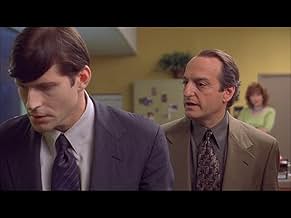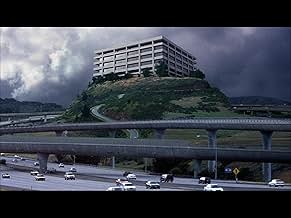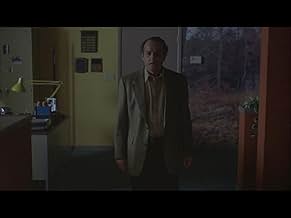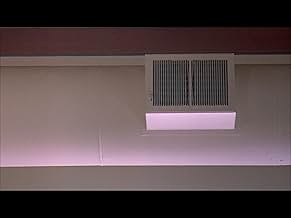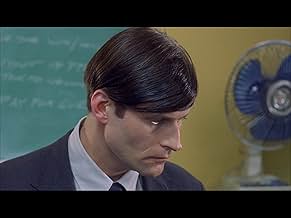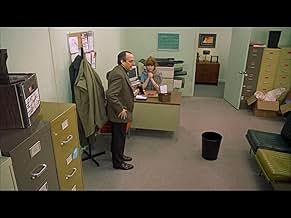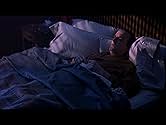AVALIAÇÃO DA IMDb
6,4/10
2,3 mil
SUA AVALIAÇÃO
Adicionar um enredo no seu idiomaA clueless boss has no idea what to do with his mundane office worker whose refusal of duties only gets worse each passing minute.A clueless boss has no idea what to do with his mundane office worker whose refusal of duties only gets worse each passing minute.A clueless boss has no idea what to do with his mundane office worker whose refusal of duties only gets worse each passing minute.
- Direção
- Roteiristas
- Artistas
- Prêmios
- 1 indicação no total
Stu Klitsner
- Professor Bum
- (as Stuart Klitsner)
Catherine DiNapoli
- Rocky's Girlfriend
- (as Catherine di Napoli)
- Direção
- Roteiristas
- Elenco e equipe completos
- Produção, bilheteria e muito mais no IMDbPro
Avaliações em destaque
The head of a public records office advertises for a new employee. Only one person responds--Bartleby, a former postal worker who at first files like a demon then lapses into apathy. Bartleby stands all day looking at an air vent in the ceiling, responding to every request from his boss and coworkers with, "I would prefer not to." Eventually the boss retaliates with passive-aggressive acts aimed at getting rid of the man. Till the very end, however, Bartleby remains an enigma, a human cipher who refuses to give up his secrets.
Hardly an engaging story premise? That's what I thought when I trudged through Herman Melville's mid-nineteenth century story "Bartleby the Scrivener" in college lit class. Sure, the story has an important theme and some interesting symbolism, but it's also dull, dull, dull. However, director Jonathan Parker has taken the best sort of revenge on this canonical work of American literature; he's turned it into a zany, low-budget, laugh fest--getting across many of the essential ideas while also entertaining his audience. Parker has approached the sort of exaggerated, stale, depressing office atmosphere seen at the beginning of "Joe Versus the Volcano" and turned it inside out, covering it with a colorful, kitschy facade to inflate the absurdity of modern information mills.
Essential to the success of the film is the fine ensemble cast. Crispin Glover deserves more lead roles, and though with Bartleby he does spend most of his time immobile and silent, perhaps no other actor can accomplish more with simple posture, well-manipulated expressions, and quirky movement. Glenne Headly is a scream in her exaggerated seduction attempts aimed at Seymour Cassel. Joe Piscopo is also in fine form as the office macho man, though he has aged dramatically since we saw him last in, what--"Wise Guys"? Maury Chaykin gives the overweight and nerve-racked Ernie a comic flair, playing with his desktop windup toys only to flinch every time they jump, and pulling off an impressive physical comedy scene involving a sandwich, a photocopier, and a watercooler. Finally, David Paymer as "The Boss" provides a solid focus for the film with his adaptive performance of a complex character.
Hardly an engaging story premise? That's what I thought when I trudged through Herman Melville's mid-nineteenth century story "Bartleby the Scrivener" in college lit class. Sure, the story has an important theme and some interesting symbolism, but it's also dull, dull, dull. However, director Jonathan Parker has taken the best sort of revenge on this canonical work of American literature; he's turned it into a zany, low-budget, laugh fest--getting across many of the essential ideas while also entertaining his audience. Parker has approached the sort of exaggerated, stale, depressing office atmosphere seen at the beginning of "Joe Versus the Volcano" and turned it inside out, covering it with a colorful, kitschy facade to inflate the absurdity of modern information mills.
Essential to the success of the film is the fine ensemble cast. Crispin Glover deserves more lead roles, and though with Bartleby he does spend most of his time immobile and silent, perhaps no other actor can accomplish more with simple posture, well-manipulated expressions, and quirky movement. Glenne Headly is a scream in her exaggerated seduction attempts aimed at Seymour Cassel. Joe Piscopo is also in fine form as the office macho man, though he has aged dramatically since we saw him last in, what--"Wise Guys"? Maury Chaykin gives the overweight and nerve-racked Ernie a comic flair, playing with his desktop windup toys only to flinch every time they jump, and pulling off an impressive physical comedy scene involving a sandwich, a photocopier, and a watercooler. Finally, David Paymer as "The Boss" provides a solid focus for the film with his adaptive performance of a complex character.
Ordinarily when the industry tries to turn a short story like Melville's "Bartleby the Scrivener" (which I haven't read since high school) into a "major motion picture," you can forget about it. The kiss of death. You want to see an example, watch Hollywood's version of "The Snows of Kilimanjaro" sometime, especially the scene in which Gregory Peck receives a message -- that famous floating pregnant italicized first paragraph of Hemingway's -- and reads it aloud between guffaws in a smokey saloon midway through the film.
I wasn't expecting much from this movie either. It has less action than Hemingway so I was prepared to switch channels on impulse. But I was surprised because it turned out to be very well done. Melville is often cited as a forbear of Kafka but I don't know how well deserved that description is. The fact is that after Melville and before Kafka there was an enormous interest in bureaucratization, the "rationality" of labor as Max Weber referred to it. It was the period in which small craftsmen were being replaced by the kind of gigantic corporations that "alienated" the worker. Henry Ford adopted Jackson's "assembly line" methods and -- well, you get the picture. Bureaucracy, as a social problem and as a literary subject, was in the air. Anyway there's a little touch of Ionesco in here too, in addition to Kafka.
Wardrobe is great. Everyone's dress reflects his or her personality but not in any obvious way. Art direction is equally well done. The acting could hardly be improved upon and the script is surprisingly well joined. The latter two points are important because this is hardly more than a staged play and is very dependent on those aspects of production. And, oh, I have to mention the score too. Most of the music is a tinkling solo piano straight out of a silent movie. The rest is most queerly orchestrated: percussion, piano, bowed bass, theramin, trombone and vibes. (It's as if someone had thrown the name of every possible instrument into a hat including the glockenspiel and drawn out half a dozen at random.)
There isn't space enough to get into the rewards this film offers but let me mention two anyway. The performances are fine, but Glenn Headly is outstanding with her hooded eyelids and her gaze which seems to drop unzippingly down a man's body when she speaks to him. Her voice is sultry, mellifluous, insinuating. And her posture! Well, it's easy to get laughs out of a funny walk. Monty Python built a sketch around the idea. But Headly's BELONGS to her character. Her pelvis and belly are thrust forward, her shoulders drawn back, a Venus of Willendorf minus two hundred and fifty pounds.
The script -- except for an overblown plea for something called "humanity" at the end -- is not only engrossing but at times extremely funny if it's listened to. (The director doesn't shove the comedy down your throat.) After Bartleby refuses to work anymore by simply saying, "I prefer not to," half a dozen times, the other three office workers pick up on the word and begin using it unthinkingly. "Would you prefer coffee or tea?" "Your wife is on line three, or line two if you'd prefer." It begins to drive the boss mad. Another line: "Business Park! What kind of address is that? Those two words should never be used together. There's a word for people who do that. Oxymorons." And a delapidated old drunken bum stops the boss on a street and asks him, "Pardon me. Do you happen to have an extra dollar and thirteen cents? I was just xeroxing my dissertation --"
Melville's symbolism could get a bit thin -- the lightening rod salesman -- but Bartleby is more like the white whale. And I hate to say this because I'm sure Meville wouldn't have said it but there's a certain concordance between "Moby Dick" and "Bartleby. Both contrast the instrumental aspect of capitalism (the records room boss and the crew of the Pequod) with a stubborn and apparently spiritless self dermination (Bartleby and Ahab). As for the whale, I frankly don't know what he stands for unless it's the unknowable itself.
This film is really pretty good.
I wasn't expecting much from this movie either. It has less action than Hemingway so I was prepared to switch channels on impulse. But I was surprised because it turned out to be very well done. Melville is often cited as a forbear of Kafka but I don't know how well deserved that description is. The fact is that after Melville and before Kafka there was an enormous interest in bureaucratization, the "rationality" of labor as Max Weber referred to it. It was the period in which small craftsmen were being replaced by the kind of gigantic corporations that "alienated" the worker. Henry Ford adopted Jackson's "assembly line" methods and -- well, you get the picture. Bureaucracy, as a social problem and as a literary subject, was in the air. Anyway there's a little touch of Ionesco in here too, in addition to Kafka.
Wardrobe is great. Everyone's dress reflects his or her personality but not in any obvious way. Art direction is equally well done. The acting could hardly be improved upon and the script is surprisingly well joined. The latter two points are important because this is hardly more than a staged play and is very dependent on those aspects of production. And, oh, I have to mention the score too. Most of the music is a tinkling solo piano straight out of a silent movie. The rest is most queerly orchestrated: percussion, piano, bowed bass, theramin, trombone and vibes. (It's as if someone had thrown the name of every possible instrument into a hat including the glockenspiel and drawn out half a dozen at random.)
There isn't space enough to get into the rewards this film offers but let me mention two anyway. The performances are fine, but Glenn Headly is outstanding with her hooded eyelids and her gaze which seems to drop unzippingly down a man's body when she speaks to him. Her voice is sultry, mellifluous, insinuating. And her posture! Well, it's easy to get laughs out of a funny walk. Monty Python built a sketch around the idea. But Headly's BELONGS to her character. Her pelvis and belly are thrust forward, her shoulders drawn back, a Venus of Willendorf minus two hundred and fifty pounds.
The script -- except for an overblown plea for something called "humanity" at the end -- is not only engrossing but at times extremely funny if it's listened to. (The director doesn't shove the comedy down your throat.) After Bartleby refuses to work anymore by simply saying, "I prefer not to," half a dozen times, the other three office workers pick up on the word and begin using it unthinkingly. "Would you prefer coffee or tea?" "Your wife is on line three, or line two if you'd prefer." It begins to drive the boss mad. Another line: "Business Park! What kind of address is that? Those two words should never be used together. There's a word for people who do that. Oxymorons." And a delapidated old drunken bum stops the boss on a street and asks him, "Pardon me. Do you happen to have an extra dollar and thirteen cents? I was just xeroxing my dissertation --"
Melville's symbolism could get a bit thin -- the lightening rod salesman -- but Bartleby is more like the white whale. And I hate to say this because I'm sure Meville wouldn't have said it but there's a certain concordance between "Moby Dick" and "Bartleby. Both contrast the instrumental aspect of capitalism (the records room boss and the crew of the Pequod) with a stubborn and apparently spiritless self dermination (Bartleby and Ahab). As for the whale, I frankly don't know what he stands for unless it's the unknowable itself.
This film is really pretty good.
Herman Melville's short story "Bartleby the Scrivener" gets a slightly surreal update in this offbeat comedy drama. The manager (David Paymer) of the city records department in a mid-sized California community decides that his staff of three - flirty chatterbox Vivian (Glenne Headly), sloppy Vietnam vet Ernie (Maury Chaykin), and slick-suited, Don Juan wannabe Rocky (Joe Piscopo) - could use some help, so he places an ad looking for a new employee. The boss ends up hiring the one and only applicant who wants the position, a quiet, pale young man named Bartleby (Crispin Glover).
At first, Bartleby is a model of efficiency, but before long he loses enthusiasm for his job, much to the annoyance of his co-workers, and soon he's spending his days staring at an air conditioning vent. The Boss asks Bartleby to get back to work, but Bartleby's repeated reply to such requests is, "I prefer not to," and the Boss sees little recourse but to fire him.
However, Bartleby refuses to leave his desk, and it soon becomes obvious that Bartleby has not only stopped doing his work - he's stopped going home and has moved into the office. Bartleby was the first feature film for producer/director Parker. He also wrote the screenplay, in collaboration with Catherine Di Napoli.
There is really not enough material in Melville's story to warrant a feature length film. When "Bartleby" sticks to the text of the story it is interesting and fairly funny, but Parker is forced to add a lot of filler which is simply not very good. Worth a look, but in the end, a bit weak.
At first, Bartleby is a model of efficiency, but before long he loses enthusiasm for his job, much to the annoyance of his co-workers, and soon he's spending his days staring at an air conditioning vent. The Boss asks Bartleby to get back to work, but Bartleby's repeated reply to such requests is, "I prefer not to," and the Boss sees little recourse but to fire him.
However, Bartleby refuses to leave his desk, and it soon becomes obvious that Bartleby has not only stopped doing his work - he's stopped going home and has moved into the office. Bartleby was the first feature film for producer/director Parker. He also wrote the screenplay, in collaboration with Catherine Di Napoli.
There is really not enough material in Melville's story to warrant a feature length film. When "Bartleby" sticks to the text of the story it is interesting and fairly funny, but Parker is forced to add a lot of filler which is simply not very good. Worth a look, but in the end, a bit weak.
I found this movie disturbing. Advertised as a comedy, it is no such thing. There is a lot of comedy in there, all right, but overall the themes are heavy, disturbing, even horrific. Crispin Glover's performance is flawless, and his role in the story is to pose a lot of questions that never get answered. The story revolves around the other characters' failure to figure him out. The new employee at the Public Records Office in an unnamed city starts out doing a great job, but he does less and less work as time goes on until he is spending most of his time refusing requests to perform any job tasks, or simply gazing up into the air-conditioning vent. They fire him, but he doesn't leave. It gets worse from there, believe me.
Don't know if Melville would even recognize his marvelous short story as translated into this film, or even if he'd approve...although I think he might...because the spirit of the original is here.
The satire of office shenanigans as presented by Jonathan Parker brings humor to this rather sad tale of a man determined to bring his intransigent self to the workplace and even to life itself... in the extreme. The overall effect is humane and even when the laughter comes we know something poignant is going on. David Paymer is superb as the frustrated, distraught but empathetic boss who tries to get Bartleby to be a responsive, reasonable worker/person, to no avail. Crispin Glover is a rather ghostly looking Bartleby, in a performance that demands withholding, a difficult task, but one he meets quite well.
This is good entertainment and food for thought...not often the case in movies these days.
The satire of office shenanigans as presented by Jonathan Parker brings humor to this rather sad tale of a man determined to bring his intransigent self to the workplace and even to life itself... in the extreme. The overall effect is humane and even when the laughter comes we know something poignant is going on. David Paymer is superb as the frustrated, distraught but empathetic boss who tries to get Bartleby to be a responsive, reasonable worker/person, to no avail. Crispin Glover is a rather ghostly looking Bartleby, in a performance that demands withholding, a difficult task, but one he meets quite well.
This is good entertainment and food for thought...not often the case in movies these days.
Você sabia?
- CuriosidadesDick Martin's final acting performance.
- Erros de gravaçãoWhen "The Boss" goes to check out a new place for their office, he settles on a place with no electrical outlets on 3 of the walls. (The 4th wall is not shown) There's a Xerox and every desk has a computer. This arrangement would be completely unacceptable for any office manager.
- Cenas durante ou pós-créditosBefore the opening credits begin, viewers are given a portrait and short biography of Herman Melville, upon whose story the film is loosely based.
- ConexõesReferenced in Stargate: Atlantis: The Lost Boys (2005)
- Trilhas sonorasPhantasie #3 In D Minor
Written by Wolfgang Amadeus Mozart (as Mozart)
Background music on piano by Nancy Spottiswoode
Principais escolhas
Faça login para avaliar e ver a lista de recomendações personalizadas
- How long is Bartleby?Fornecido pela Alexa
Detalhes
- Data de lançamento
- País de origem
- Central de atendimento oficial
- Idioma
- Também conhecido como
- Bartleby at the Office
- Locações de filme
- Empresa de produção
- Consulte mais créditos da empresa na IMDbPro
Bilheteria
- Faturamento bruto nos EUA e Canadá
- US$ 148.479
- Fim de semana de estreia nos EUA e Canadá
- US$ 14.599
- 27 de mai. de 2002
- Faturamento bruto mundial
- US$ 148.479
Contribua para esta página
Sugerir uma alteração ou adicionar conteúdo ausente


